Two weeks after I had quit my job in October 2017, my boss sat down with me to check whether I was really serious. So I told him about the intense feeling of liberation that I had felt ever since making that decision, and how somewhat overwhelming it was to think about all the options I had. There had definitely been that sense of I can do anything I want now, the world is my oyster and the sky is the limit. So I mentioned to him that I could even become a safari guide, to which he laughed at bit. To be honest, I don’t think that it was an ill-intended laugh, but it did come across as a bit of a smirk. As if he thought that it was the stupidest idea he had ever heard. And that was the moment I knew: I am going to be a safari guide. Admittedly, doing this out of spite is probably not the best of reasons, but hey, I’m only human.. I have my (very few) weaknesses.
Turns out, it takes 55 days to become a safari guide, or field guide as the official title reads. At least, it takes 55 days if you’re rich, not from Africa and don’t know anything about African nature (you may think you do, but you don’t).
It’s mid-August 2018 and together with my fellow students Karsten, Suzanne, Niklas (all German) and Terrence (Zimbabwe) we set up camp in the Stanley & Livingstone Game Reserve just south of Victoria Falls, Zimbabwe. Stanley & Livingstone is one of very few places where black rhino are still.. well, alive, I guess and we move into the unfenced Mopani camp, which we will share with the anti-poaching crew.
Each of us gets his/her own tent to call his/her home for the next two months and otherwise there’s not much. Sure, there’s a communal area, i.e. dining table with chairs, a makeshift gym consisting of a pull up bar and a fire pit. Otherwise, it’s just nature.
Now, this doesn’t mean we’re roughing it though. The tents are larger than the back of my Montero, and during the entire stay our chef Senzo cooks the most tasteful meals I’ve ever had. And I am a very picky eater!
It doesn’t take long, however, for us to realise that this is not going to be a long holiday. Upon our arrival in camp, our instructor Dave gives us a brief description of what we can expect. During the next 8 weeks, this will be the daily program:
- 05.30 – 06.00: wake up
- 06.00 – 06.30: have simple breakfast (cornflakes)
- 06.30 – 09.30: morning drive / walk
- 10.00 – 10.45: breakfast
- 11.00 – 12.00: lecture
- 12.00 – 15.30: study time
- 15.30 – 16.00: lunch
- 16.30 – 18.30: afternoon drive / walk
- 19.00 – 20.00: dinner
- 20.00 – 21.00: leisure time
- 21.00 – 05.30: sleep
Except for Sundays; this generally is a day where we can sleep late and go to a nearby lodge to enjoy the pool/wifi.. I mean to study.
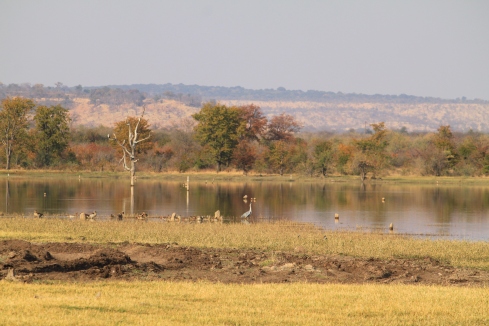 At the end of these eight weeks, we will be doing an official theoretical exam, and we’ll be guiding a game drive that needs to be informative and entertaining. But, that’s not all: there will also be a test on 90 birds (both pictures and sounds), 27 reptiles (pictures) and 12 amphibians (pictures and sounds). AND in the mean time we will have to show proficiency in knowledge of 40 trees, 28 animal alarm calls, 20 animal tracks, 12 animal dung, 10 grasses & wild flowers, 9 types of soil, 8 constellations, 5 deep space objects, etc… Oh yeah, and then there’s the animals.. people who go on a safari generally want to hear something about animals as well.
At the end of these eight weeks, we will be doing an official theoretical exam, and we’ll be guiding a game drive that needs to be informative and entertaining. But, that’s not all: there will also be a test on 90 birds (both pictures and sounds), 27 reptiles (pictures) and 12 amphibians (pictures and sounds). AND in the mean time we will have to show proficiency in knowledge of 40 trees, 28 animal alarm calls, 20 animal tracks, 12 animal dung, 10 grasses & wild flowers, 9 types of soil, 8 constellations, 5 deep space objects, etc… Oh yeah, and then there’s the animals.. people who go on a safari generally want to hear something about animals as well.
Now, as if that isn’t daunting enough, there will also be weekly tests, so-called Field Observations, to test us on what we’ve covered up to that point. And we have a workbook to complete weekly AND we have a study assignment to be completed before the end of the course.
Yep… that certainly does NOT sound like a holiday to me?!
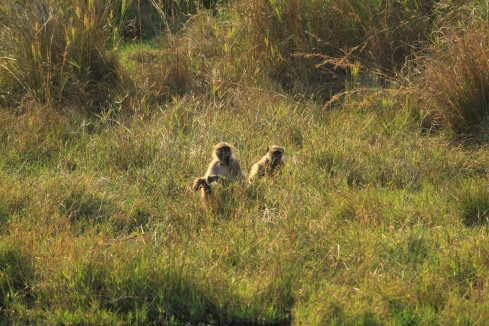
We start off with a day of nature walks with local guide Abraham, and it quickly becomes apparent that we will need to takes notes.. lots of notes. Then, the next days Dave takes us on game drives through the park and what we experience here can only be described as a bombardment of information. He picks up a rock and tells us it’s basalt, then he picks up another rock and tells us it’s clearly a different type of rock called ferricrete, and then another one: dolerite. We hear birds, so he stops and tells us that it’s a lilac-breasted roller or a African wattled lapwing or a Southern ground hornbill.
Then we’ll stop for a tree and he’ll point out the leaf structure, and how this differs amongst trees.

Notes to remember leaf structure
He hardly speaks about animals, but even if he does, it rarely is something I’ve heard before. It’s all new, it’s continuous, it’s relentless. Luckily, I’m not alone: all of us are quite shocked by what is happening. This is not what we were expecting.
Then, in the second week, Dave ups the ante. Now, he won’t be driving anymore: we will. We, the students, will take turns in guiding our little group through the park. And we’re supposed to stop and talk about soil, trees, birds, animals. Even though we feel we haven’t learned anything yet.
This definitely adds pressure to us, because even though everyone knows this is just practice, one generally wants to do well in these kinds of situations. You don’t want to take people out for a boring drive. Of course, Dave doesn’t stop teaching (or instructing would be a better word probably).. oh noooo, he keeps bombarding us with information.
Personally I kinda luck out on my first two drives. On my first drive there’s an elephant that approaches the car to about two meters, and on my second drive a black rhino comes even closer and almost scratches the car’s paint with its cut-off horn. This is pretty cool stuff, so everyone is excited and happy.
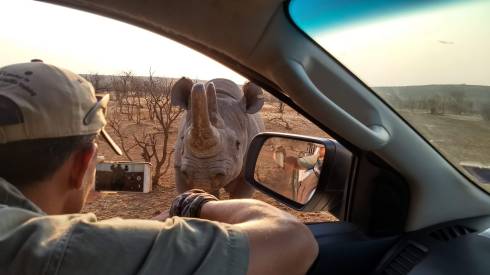
An inquisitive black rhino coming in for a closer look
Niklas has one of the easiest game drives ever. He happens to find two lions mating. Pretty darn cool.. and as a guide it’s easy: you let nature do the talking.
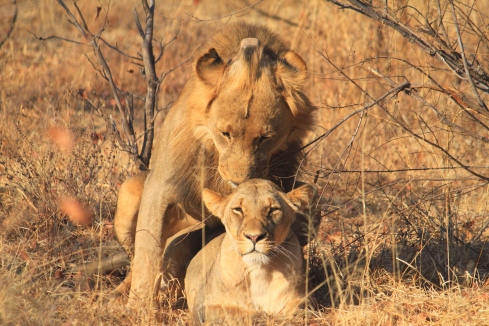
Karsten is not that lucky though and has some rather uneventful drives; furthermore, he clearly struggles with keeping up with all the information that is coming his way. At the end of the week, after a loooong phone call with his wife, he throws in the towel; he won’t be doing the test. It is a magical move on his behalf. No more compulsory lectures for him, no more pre-game-drive-stress, no more bird calls to learns, no more trees to recognise. From that moment onwards he just casually sits in the back of the car, listens to whatever he wants to hear, and otherwise simply relaxes. As for the others, we understand his move, we envy him for making the decision, but our egos keep us from what would feel like giving up.
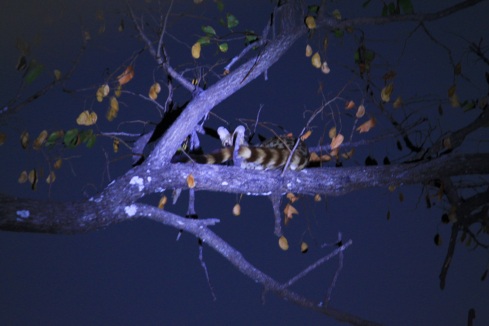
My first ever (large spotted) genet!
By the third week, the ante is upped again. We’ve been introduced to 30 trees within 10 days, but already even recognising and identifying a tree isn’t enough anymore. Dave makes it quite clear that being a guide is all about adding value: you don’t just point out an animal.. no, you add value by telling something interesting about the animal for example whether it’s territorial, what it eats etc. And this isn’t limited to animals. Same goes for trees: we will need to add value for example by explaining the cultural significance, be it as a medicine, a practical use or some mystical belief.
For instance, the mopani tree. Its leaves resemble a butterfly, which in Shona language is mopani. When crushed the leaves smell somewhat like turpentine. Its seeds become sticky when rubbed, so as guides we would add value to our clients’ safari experience by picking some leaves or seeds and letting them touch or smell them. And then add even extra value by explaining how local people use the bark to stop diarrhoea, or the leaves to stop a little cut from bleeding. Honestly, I find this super interesting. I find that I really enjoy these little “stories”, whether it’s about birds, trees or stars. But obviously, I’m still struggling with the first and main challenge: to identify that bird or tree.
In the meantime, we also have these “lectures”. These cover the theory behind subjects like geology, astronomy, weather/climate/clouds, conservation management and even historical human habitation. It really is as if we’re back in school. But honestly the content of these lectures is quite useless. They consist of powerpoint slides that Dave just races through as if it’s common knowledge. Obviously, in theory we should read the relevant chapters of our study books beforehand, but after two weeks of trying I give up.. there simply is no time.
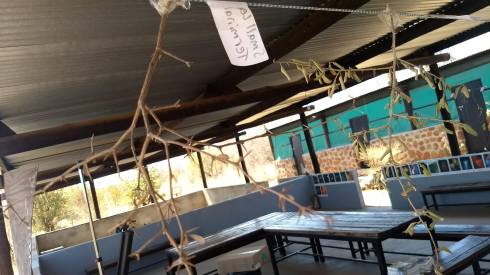
Lecture room
It was probably week four when my resilience started to break. Obviously we’re all learning the exact same things and we’re always the same group going out. So on our game drives we’re basically repeating what the other students have said yesterday or even a few hours ago. And to me it is very very difficult to pretend I didn’t hear all that, to pretend that this isn’t the same group of people all the time. So I quietly refuse to be the fourth person to make a butterfly out of a mopani tree leaf, I simply won’t. Nor can I be bothered to pluck some yellow thatching grass to explain for the gazillionth time that this grass is used for thatching roofs. Really man, who goes on a safari and wants to hear about that. People want to see lion and elephant and leopard.. and I feel we’re learning nothing about them.
As expected, this doesn’t earn me very positive feedback from Dave. And he clearly has no intention of discussing my reservations. These tasks are what needs to be done in order to become a guide.. so deal with it. Now… I think I can safely say that I am not a person who thrives when confronted with that style of “leadership”.
I remember how many many years ago my late grandfather was given a home-trainer-cycle-thing as a birthday present. My dad told him not to go too crazy on it, which prompted my granddad to immediately jump on the bike and show us that he was fit. For barely a minute he cycled like a maniac until he was completely out of breath. But not for a second did he feel that he had actually proven my dad right. It probably wasn’t even about that. If anything, it was about him making the point nobody should tell him how to do things. And I think I am at that point now. Like my grandfather, I don’t do things your way; I do things my way!
Luckily, at this point it is time for a little break in our busy schedule…
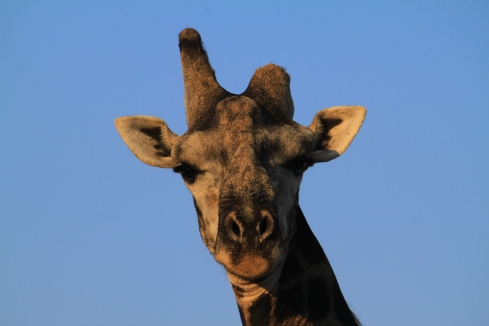






















I can’t believe how close you got to a Rhino that’s spectacular. I hope you don’t give it up, easy for me to say when my only research consists of how much I should pay for a Triumph Bonneville on eBay but please stick with it. BTW did I miss something? Last I read you went in South America with a Kayak and a car.
Je mag wel onze gids zijn… maar wel met added value